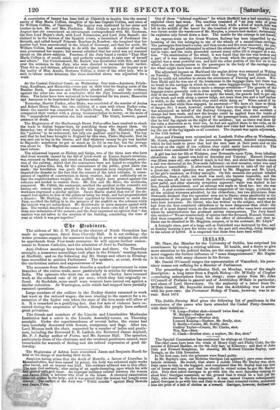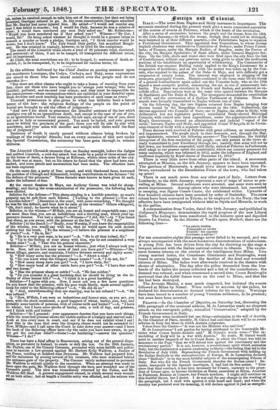IRELAND.
Mr. Shaw, the Member for the University of Dublin, has surprised his constituents by issuing a retiring address. Ill health, and a desire to give more attention to his judicial duties, are the causes assigned: an Irish com- ment suggests the further influence of " some disappointment." Mr. Napier is in the field, with many chances in his favour.
Mr. Daniel O'Connell resigns the representation of Waterford; his pecu- niary means not sufficing for a Member of Parliament.
The proceedings at Conciliation Hall, on Monday, were of the staple description: a long letter from a Popish Bishop—Dr. M'Nally of Clogher —enclosing subscriptions from his clergy; some praise from Mr. John O'Connell of Prelates in general and of Archbishop M'Hale in particular; and abuse of Lord Shrewsbury. On the authority of a letter from Dr. M'Hale himself; Mr. Reynolds denied that the Archbishop was in arrear with his poor-rate: the Protestant Bishop -of Tnam, however, was in ar- rear. Rent 1671.
The Dublin Evening Mail gives the following list of gentlemen in the
commission of the peace who have attended the Cashel Petty-Sessions,
with their liabilities—
"R. Long—Father shot—himself twice fired at. W. Murphy—Father shot. Samuel Cooper—Brother shot. Leonard Keating—Nephew, Mr. Scully, shot. E. Scully—Cousin, Mr. Scully, shot. Godfrey Taylor—Cousin, Mr. Clarke, shot. Wm. Roe—Shot.
C. Clark—Brother shot; a nephew, Mr. Roe, shot."
The Special Commission has continued its sittings at Clonmel. The chief cases have been the trials of Henry Cody and Philip Cody, for the murder of Edward Madden, on the 9th July last, at Killerney ; and that of John Daly and Edward Roughnan, for shooting Mr. &chard Uniacke Bayley, near Nenagh, on the 13th November. In the first case, both the prisoners were found guilty.
In Mr. Bayley's case, one Nicholas Garrigan (an approver) gave some charac- teristic tic evidence. He stated, that about a month before Mr. Bayley was shot, Daly came to him in the haggard, and complained that Mr. Bayley had run him out of house and home, and that he should be ruined unless he got Mr. Bayley shot. Daly then asked Garrigan to go with him the next Saturday evening to shoot him: Garrigan consented, on the ground that it would be a bad job for Daly, who would be the first suspected. A man named Connors subsequently asked Garrigan to go with him and Daly to shoot their intended victim, promising him the price of a suit of clothes as a reward. Carrigan, however, declined the
job, unless he received enough to take him out of the country; but that not being promised, Garrigan refused to go. In his cross-examination Garrigan admitted that Mr. Bayley had never injured him. He added—" I would not murder any man I was asked to murder; but I would for Daly, because he was a relative of mine: I would have murdered any man Daly asked me." Mr. Rollestone-
Would TOIL have murdered me if they asked you? " Witness—" By Gor, I would, On being asked whether he thought it would be a greater crime to commit a murder or break a pledge, Garrigan said, " I think murder would be worst; but I don't know." The Jury found Daly guilty, but acquitted Rough- win. He was retained in custody, however, to be tried for the conspiracy.
The result of the Limerick trials shows a total of 38 prisoners tried, convicted, and sentenced: of these, 6 are to be hanged, 18 transported for different terms, and 24 imprisoned. At Clare, the total convictions are 31: to be hanged, 5; sentences of death re- corded, 5; to be transported, 9; to be imprisoned for various terms, 12.
In the address delivered by the Chief Justice on passing sentence upon the murderers Lonergan, the Codys, Corboys, and Daly, some expressions are aimed at those who have moral control over the people and do not exercise it—
"But there are other classes who ought to take a lesson of warning from your fate: there are those who have bought you to' avenge your wrongs, who have justified, palliated, and excused your crimes; and they must be responsible for the consequences—those consequences which are exhibited in your dreadful cases. Such doctrine and such teaching has been productive of such cases as yours."
Unusual prominence is also given to what has hitherto been a latent terror of the law: the religious feelings of the people on the point of burial are brought to aid the effect of judgment— "And now I am about to pronounce the dreadful sentence of the law which consigns you all to an ignominious death, and, except in the case of one of you, to an ignominious burial Your remains, the law says, except of one of you, must not rest in holy or consecrated ground. Yon must be buried, and your graves must be within the precincts of the gaol; there you will lie side by side with murderers, and your ashes will moulder and mingle with theirs until the final day of judgment."
Sentence of death is rarely passed without silence being broken by wafflings of the culprits' friends; but on every occasion of this sort under the Special Commission, the ceremony has been gone through in solemn stillness.
The limerick Chronicle recounts that, on Sunday sennig' ht, before the Judges bad quitted Limerick, a mid-day attack was made by a party of three armed men on the house of Scott, a farmer living at Killonan, within three miles of the city. Mr. Scott was at mass; but on his return he found that the place had been ran- sacked, and some pistols and ammunition had been stolen. The offenders have not been captured.
On the same day, a party of four, armed, and with blackened faces, traversed the parishes of Clonogh and Kilscannell, levying contributions on the farmers "for the defence of the prisoners." Three farmers were known to have given II. each, under the influence of fear.
At the recent Sessions in Mayo, one Anthony Gavan was tried for sheep- stealing; and during the cross-examination of the prosecutor, the following facts were elicited.
Solicitor for the defence—"This sheep-stealing is a horrible practice; no man's property can be safe from such fellows. [Turning to theprisoner]—You are he was for the defence, and hear how he rails at the creature." th
a horrible fellow!" [Sensation in the court, with some remarking e"raWwehtihsought ce "Oh, don't mind; he knows what he is about."] Solicitor, to the witness--"M'Ilale, you are an honest and respectable man; you are more than that, you are an industrious and a thriving man, which your ap- pearancedenotes. on lost a sheep ?"—Witness—" I did, Sir."—Q. "Yon found that sheep, as you swear, with the prisoner at the bar."—A. "I did, Sr."
Solicitor [to the Bench]—" Really, your Worship, if you knew the respectability of the witness, you would say with me, that he would upon his oath declare nothing but the truth. [To the witness]—I believe the prisoner is a neighbour of yours?"—A. " He is, Sir." Q. "He is a very poor man, is he not? "—A. " He is all that indeed, Sir." Q. "Up to the finding of your sheep with him, was he not considered a very honest man? "—A. "That was his general character." Solicitor—" M'Hale, you are an honest witness; just what I always took you to be. Now, tell me how many acres of land you have got ?"—Witness—" Be- tween tillage, pasture, and mountain, I believe between seventy and eighty acres." Q. "How many acres has the prisoner? "—A. "About a rood." Q. " Do you know what the Gregory clause means ? "—A. " I do not, Sir." Q. "How many sheep have you got? "—A. "I have sixty, Sir." Q. "How many head of other cattle have you got? "I have four cows and two horses."
Q. " Has the prisoner sheep or cattle? "—A. "He has neither."
Q. "Do you consider it a ireat hardship that he should be livinj on the in- dustry of other honest folk? '—A. "1 think it is a great hardship.
Solicitor—" I agree with you. Now, I must ask you a few more questions. Do you know that the prisoner, with his poor weak family, made several applica- tions for relief to the Relieving-officer? "—A. " He did do so." Q. "And, notwithstanding they are starving, was he not refused? "—A. "He was refused." • • Q. "Now, Miele, lain sure an industrious and honest man, as you are, you have, with the stock mentioned, a good haggard of wheat, barley, oats, hay, and probably some barrels of potatoes, with of course milk and butter? "—A. " I have no wheat; but I have some stacks of barley, oats, a lock of hay, and potatoes, and I think milk and butter."
Solicitor—" So I guessed: your appearance denotes that you have such things, while the wretched prisoner shows the visible outline of a hungry and starved man ! Look at him every man in court, and say if he does not exhibit what I say ! And this is the man that even the Gregory clause would not be extended to! Now, M`Hale—and I call upon the Court to take down your answer—and I have the book of the Relieving-officer here—by the oaths you have here sworn, do you not get the out-door relief?—Come!—no hesitating!—answer the question." Witness--" I do!"
There has been a fatal affray in Roscommon, arising out of the general dispo- sition, so prevalent in Ireland, to evade or defy the law. On the 26th January, Mr. Peyton, one of the County Coroners, proceeded with some bailiffs and police- men to execute a law-process against Mr. Herbert Kelly Waldron, a Justice of the Peace, residing at Ashford near Drumsna. Mr. Waldron had prepared him- self for resistance by arming several of his retainers, who were stationed behind the entrance-gate of the property. The Coroner vainly endeavoured to persuade Mr. Waldron to submit quietly to the execution. When an attempt was made to force open the gate, Mr. 1Valdron fired through the bars, and wounded one of the Coroner's party. The shot was immediately returned by the Police, and Mr. 1Valdron fell dead. A general engagement ensued, in which several were wound- ed on both sides; but at length a forcible entry was effected, and the seizure was Made.



























 Previous page
Previous page